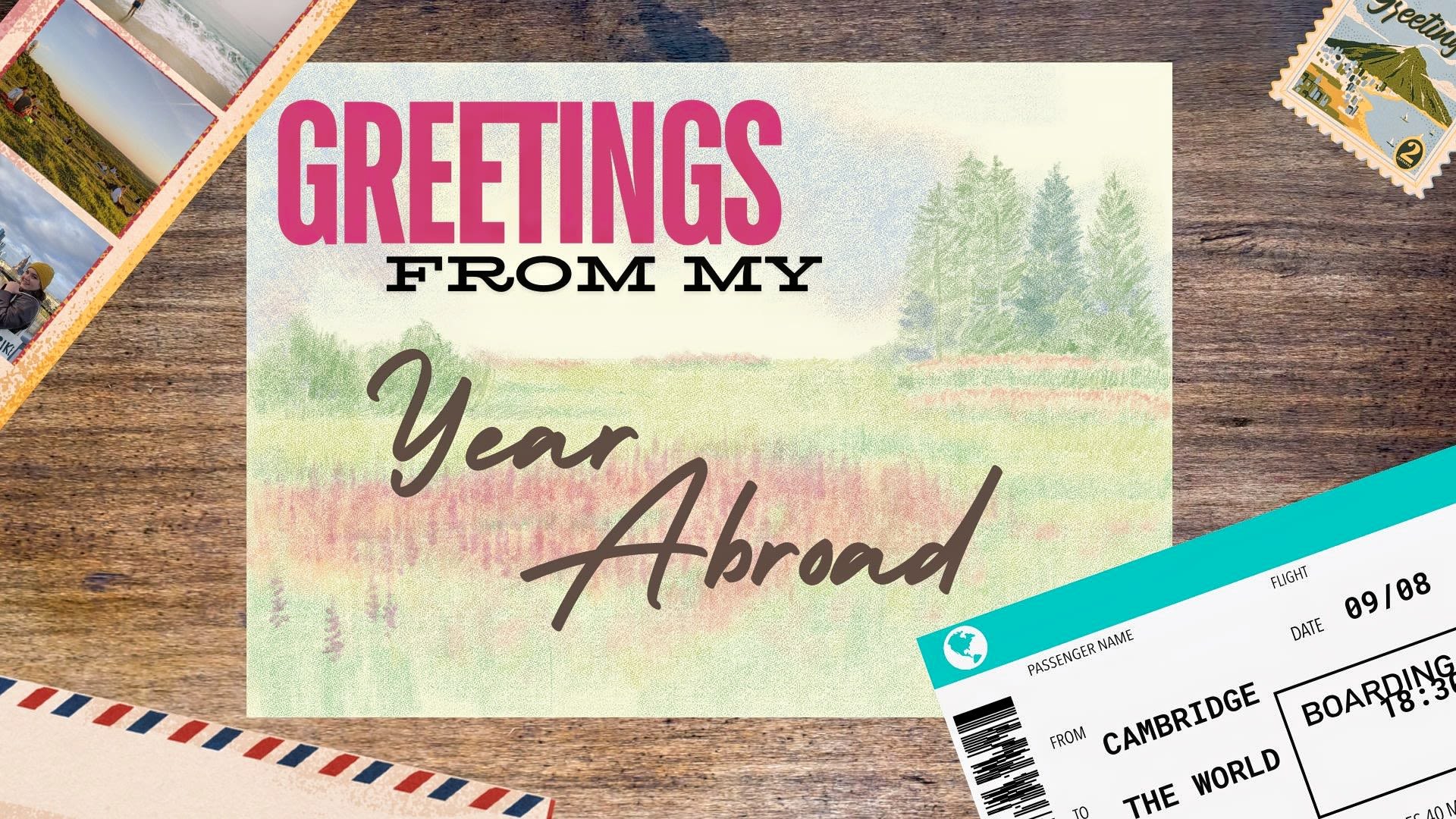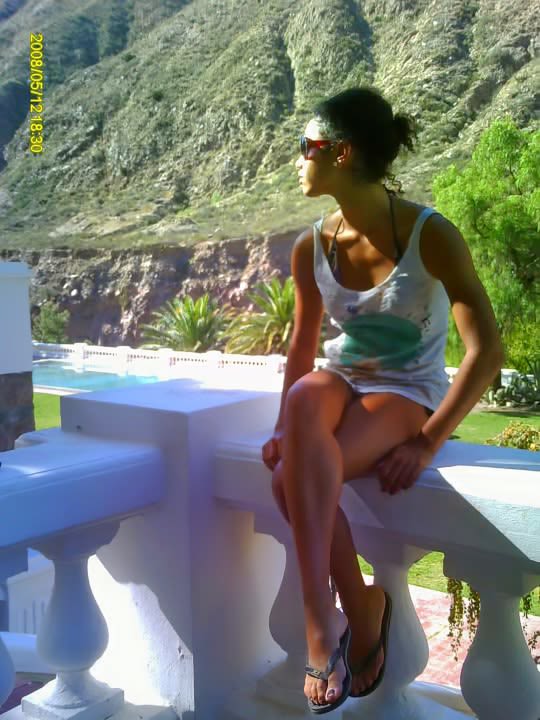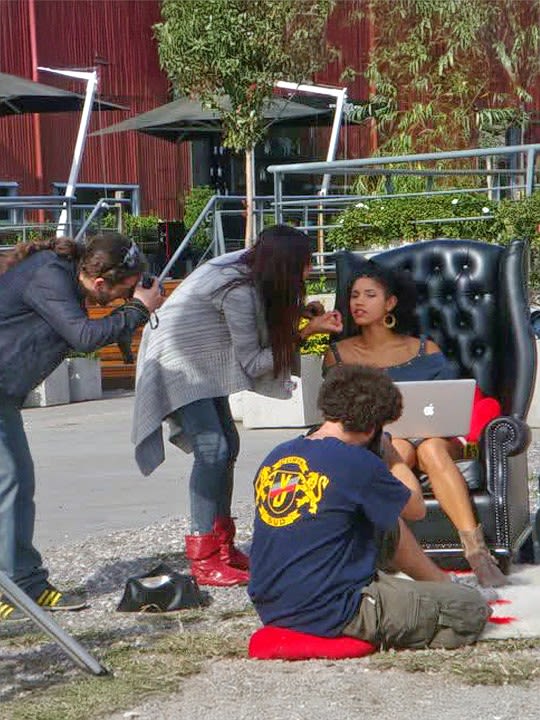An Electric Year
Vick Hope’s Year Abroad and tales of encounter and transformation
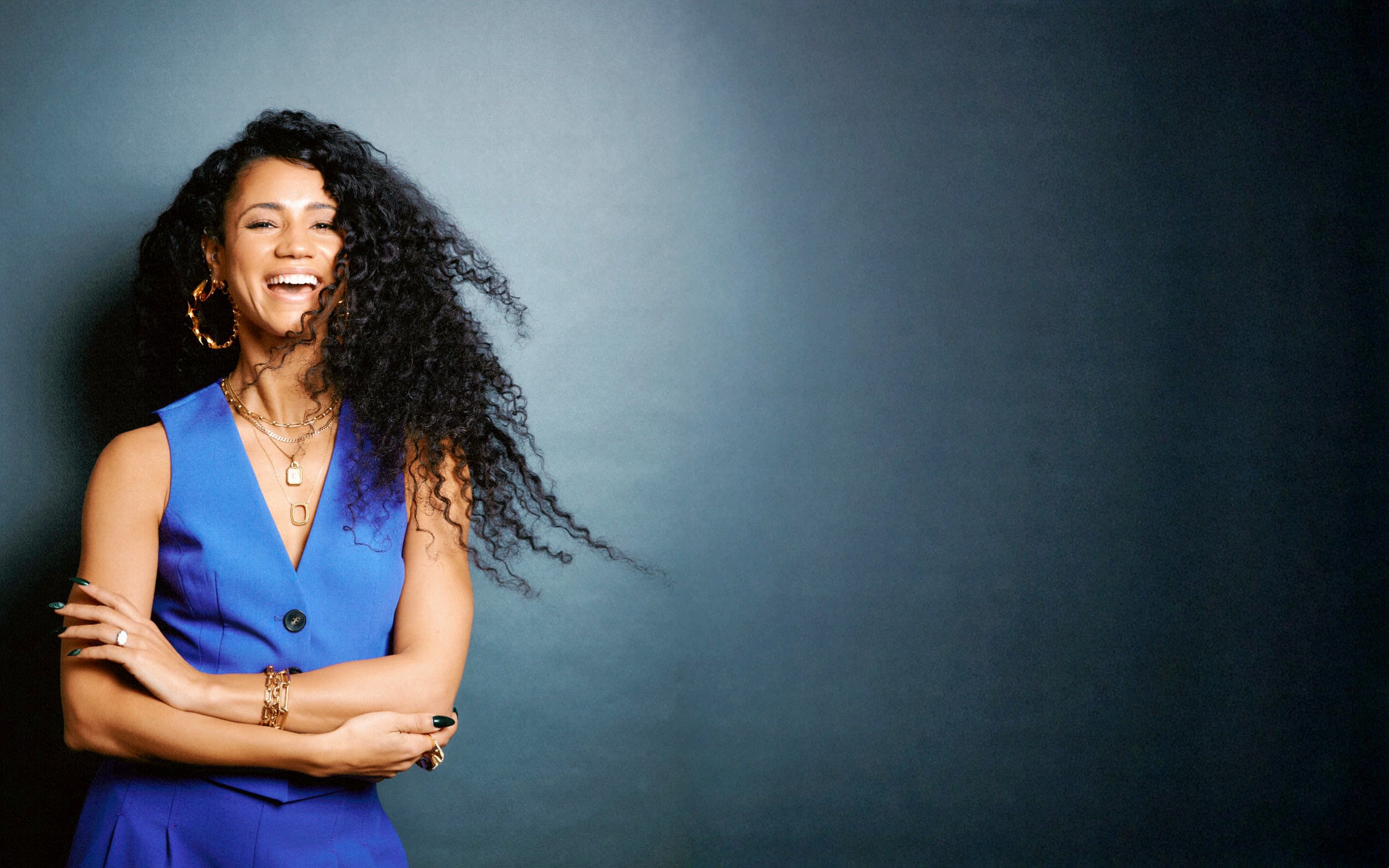
The alumna, broadcaster, author, and Amnesty Ambassador takes us on a deep dive into the far-reaching personal and professional impact of her Year Abroad—and shares why this opportunity is so valuable.
The Year Abroad (YA) is the cornerstone of the MMLL Tripos, building, testing and enhancing students’ knowledge and skills—alongside the obvious pleasures and adventures of exploring an entirely new landscape.
But that’s just the beginning.
Through the YA, Cambridge students encounter difference—of thought, communication, culture and expression—and are personally and intellectually transformed. Not least, they encounter themselves in a new way. The YA recalibrates their beliefs, their ambitions and their conception of the future.
This valuable experience is under increasing pressure from changes and uncertainty in funding for the humanities in higher education, particularly for language learning. The shift has made language study less accessible to some students, especially those already experiencing economic disadvantage.
That’s where philanthropy comes in—our goal is to secure sustainable, long-term funding for this vital element of the Tripos. We’re launching the Year Abroad Appeal to raise funds to support student bursaries and showcase the immeasurable value of the YA and the impact—both anticipated and unforeseen—of this unique and immersive opportunity.
And while Vick Hope (Emmanuel 2007) was hardly a stranger to challenge, discovery and serendipity before her Cambridge career, the impact of her YA and MMLL degree was truly transformative on every level—for herself and for the lives she touches today through her career and her work with young people.
We caught up with the busy alumna recently to find out more.
Tell us a little about your YA. Where did you go and why?
I went to Buenos Aires in Argentina. The plan was to spend six months there, and then for six months I was going to study at the University of Santiago in Chile. But it was the year of Chile’s Big Quake, so halfway through my YA my plan became unfeasible. But by then, I'd really settled into life in Argentina. I had a job and a group of friends, and I was quite happy to stay put. I was doing a brilliant journalism internship with a newspaper now called the Argentina Independent, an English-language news magazine that was distributed around the city and covered everything from Latin American politics and current affairs to arts and culture.
It was a very small team, so I got good experience in writing all kinds of pieces, from reviews to an article about the local knitting group. One week, I sat on the Latin American Wider Affairs desk and covered what was at the time the bloodiest year in the Mexican drug cartel war. I'd wanted to be a journalist and a foreign correspondent since I chose to do French for GCSE, so this was amazing on-the-job learning. To have the dedicated time and space to do it was thrilling. It was an electric year.
The internship morphed into a job because I had decided to stay in Argentina. I also worked for the International Human Rights Film Festival as an assistant translator, helping to run events alongside the film showings. I was up for getting involved in as much as possible and meeting as many people as I could, so I was balancing a few different writing jobs... and then I met some producers from MTV US who needed an English-speaking presenter for a pilot they were filming.
A broadcaster tells stories, too, but I had never thought of telling stories orally as well as with the written word. I thought I'd give it a go anyway. And that was my first step into presenting.
Was your YA what you expected?
I thought I knew what journalism was, but I had my eyes opened. And this receptive mindset was because of the YA: you're given the year and told that, within certain parameters and safeguards, you can do virtually anything. I decided to fully embody that and go through every door that opened.
So the YA wasn't what I anticipated because I was expecting to finish up a neatly packaged learning opportunity in the same way as you'd wrap up your course at university: you stick to the plan and then it’s done. But things change, and that's the nature of a career.
The YA really set me up for the world of work and especially the creative industries; they are constantly evolving, and you have to move with them. I could never have planned for the opportunities that were going to present themselves and for the ways in which I was going to change over that year and learn about myself and this industry.

What is your best memory?
Attending a big festival of immigration in Rosario, a little further north of Buenos Aires, and how it was an exciting, colourful, interesting celebration, especially since I was getting the sense that in Argentina, the subject of immigration didn’t get broached so much. I had a lot of friends who were from other countries in South America, where they were very aware of their melting-pot communities. But in Argentina, I noticed that there weren't many black people. Being black myself, I asked, ‘Where is everyone?’ Historically, they used to be here. What happened? I became interested in the Afro-Argentine story. I went to Rosario, took a photographer with me, and wrote an article about the festival that became the springboard for my YA dissertation exploring the ‘whitewashing’ (as I termed it) of Argentine history.’
There is no way I could have researched such an untapped, hidden subject anywhere else because so much of my research was word-of-mouth, visiting cultural centres, and meeting with very small Afro-Argentine groups. For example, there were Afro-Argentine poems and poetry from the 1800s, and the only way I could read them was in the library. You couldn't borrow them because they were all originals. So I needed to be there, and it was an exquisite, serendipitous, and unique field research opportunity that arose just from being in-country and entirely immersed in a society.
Did your year abroad change how you thought about yourself in the world and your future? When you returned, did you make changes?
100 per cent! I worked out what I wanted to do for a career, and I started putting the wheels in motion instantly. As soon as I got back to the UK, I got in touch with the London contacts the MTV people had given me and I was in the office every chance I had—printing things, making cups of tea, essentially doing work experience. It meant that as soon as I graduated I had a job at MTV UK, so the YA literally started my career.
In terms of what I learned about myself: I became very bold. Cambridge nurtured confidence in me that I didn't have before, and a boldness and independence were born from the YA.
I loved Cambridge. It's an amazing place and to have your mind developed like that is beautiful and a very lucky thing. But I needed the real world. YA helped me spread my wings and be ready for it.
What do you think today's students stand to gain from a year abroad?
The YA delivers far more than you'd think just from looking at the prospectus. The special thing is that you tailor it to you. I had friends who had incredibly different YAs but all our choices matched the type of people we were, and we grew with those choices, so you have it all to gain. If you don't know what you want, it's a great opportunity to work that out because, fresh out of school aged 18, it's a very tall order to expect everyone to know what their options are.
What's your advice for students about to embark on their year abroad?
Think big, keep an open mind, and work hard the summer beforehand so you have a bit of money.
The Provincial Immigrant Festival of Villa del Rosario
The Provincial Immigrant Festival of Villa del Rosario
What inspired you to apply to Cambridge, and what attracted you to Emmanuel in particular?
In Year 12, I attended an access event in Newcastle that really inspired me. I knew I loved languages: I taught myself Spanish because my school didn’t offer it at GCSE level, so I went to adult education classes in the local community college and did my Spanish A level there. In fact, my interest in languages was the reason I wanted to be a foreign correspondent. I'd read The Kindness of Strangers by Kate Adie when I was quite young, and I loved the idea of meeting loads of interesting people around the world. Latin America fascinated me. I knew that democracy was very young in many of the countries. I was obsessed with Che Guevara after watching The Motorcycle Diaries (I know, I’m cringing a bit saying that, but I was!).’
It seemed like a tall order to go to Cambridge, but I thought if I'm going to go anywhere, I may as well go to the best place—or at least give it a go. I was obviously over the moon to get in, but it did feel like a world away from what I knew. When I arrived, I was so lacking in confidence. But since then, I realise that many of my peers felt the same. I didn’t know much about Emmanuel: I just thought it was pretty and nice! And when I came for the MMLL Open Day, that’s where I stayed, and I fell in love with it.
I remember meeting and talking to students and wanting to be like them. It sounded so exciting to get to study what you love every day. The idea of being able to embrace Spanish culture and language and understand the sociopolitical and historical context was compelling to me, and I realised that Cambridge would allow me to engage with all of it. I was buzzing!
Any standout memories?
Graduating, because my family were all there! For my parents, my being at Cambridge was a very big deal, and so for the whole family, I have a photograph with the embossed frame—that was a real ‘pinch me’ moment for everyone. I felt very proud.
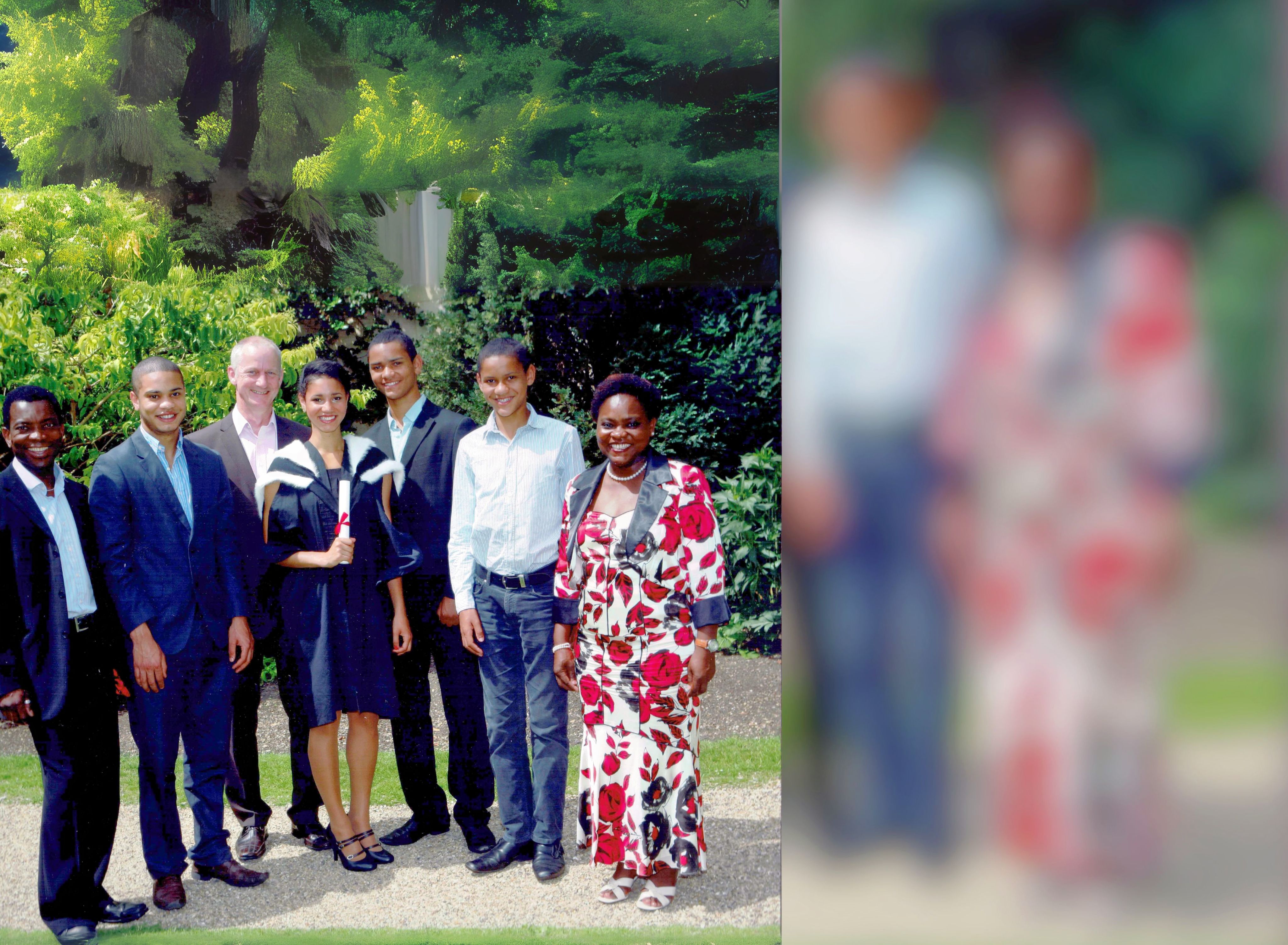
What did you learn from your time at Cambridge that's influenced your career or shaped who you are?
I learned that if you don't know the answer, it's OK to still put your hand up and ask a question. When I arrived, I noticed that there were a lot of people who had the confidence to put their hands up. That wasn't me. What I've learned and what I've found very useful for life and for my career since is that people really appreciate your asking when you don't know.
When I was applying to Cambridge and then when I was sitting in lectures, it wasn't about knowing everything; it was about exploring and how there will always be new things to learn, so I felt like my curiosity and my voice were validated and powerful.
Now I work with charities, and there are kids from some pretty difficult backgrounds, but they have stories to tell as well. They don't necessarily know their stories are valid because everyone around them makes it sound like you've got to have a certain kind of life or be a certain kind of person to have something to say.
I always try to tell them that they do have something to say.
I was very lucky to have the opportunity to be at Cambridge, where I was emboldened and learned the value of my voice. I want to pass this sense of empowerment on.
What do you think is the importance of the MMLL degree and, more broadly, the value of studying languages?
For me, learning a language was respect for the places that I was interested in, and because I really love people, talking to them, and learning about them. Nothing was ever sorted out by not talking to each other! I feel in awe of people who speak several languages from childhood, and I believe it's something we should all try to do, at least when we travel. MMLL was my opportunity to build on that sense of respect and interest.
Have I used my languages much in my career? Not necessarily, but it’s a useful ‘back pocket’ skill, especially in sports broadcasting when you see your interviewee suddenly feel so much more comfortable with you if you can communicate in their native tongue.
In life, more generally, the value of knowing a language is immeasurable. I spend a lot of time in Spain because my husband works there; I use my Spanish all the time, and I feel like a part of the society.
What do you love most about your work?
I learn something new every day. That takes many different shapes because every day is different. I might be on Radio One or interviewing an author for the Women's Prize for Fiction or on Countryfile knee-deep in frogspawn, but I always get the honour of meeting some amazing people and helping them tell their stories. People think broadcasting is about talking. It's about listening.
Can you share with us any personal or professional plans?
I've just started presenting Countryfile, and Monday to Thursday it’s Radio One Drive Time as usual, plus there’ll be another season of my podcast Bookshelfie which I host for the Women’s Prize for Fiction. I can probably say that we'll be coming back for a second series of the Tooney and Russo Show, the Lionesses podcast. I'm excited to keep bringing women's football to everyone on BBC Sounds. I’ve also just been appointed by the Prime Minister as a Trustee of the Victoria & Albert Museum, which feels a real honour, aligning with my mission to make art, culture, history and creativity accessible to all.
What piece of advice would you give your younger self?
Oh, it sounds so obvious and so simple—but just enjoy yourself! You can get so caught up in worrying about the past and the future, am I doing this right, and what does everyone think of me? Try to be in the moment and enjoy what you're doing. Otherwise, what’s the point?
It’s so inspiring to hear Vick enthuse about the impact of her YA and to watch her professional success unfold, and we were thrilled to be able to speak with her.
The future of the MMLL Year Abroad is uncertain
With YA funding dwindling, many students aren't able to follow in Vick’s footsteps and make the bold and risky choices that declare, ‘I can do anything.’ This doesn’t allow the most creative situations to arise—and these are truly the magic of the YA.
It’s critical to ensure that the best and fullest YA experience is available to coming generations of Cambridge students, regardless of background or circumstances.
Our ambition is to set up the YA for a stable, long-term future and provide students with the additional funding that many require to access and fully benefit from the unique opportunities provided by the YA experience.
Support the MML Year Abroad
Can you champion the YA and help set more MMLL students on exciting new paths?
If you are interested in learning more, please contact Kara Rann, Associate Director, Arts and Humanities or visit our website.
Related stories
On the right path
The year abroad has been opening the eyes of Cambridge modern language students for years. Here are their stories from around the world in 365 days.
Year Abroad photo competition winners
The annual Year Abroad photo competition aims to encourage students to document and reflect on their experiences, with entries often showcasing landscapes, people, and unique sights.
Notes from my Year Abroad
"I promise that the challenge is worth it." Isobel Butter (Murray Edwards 2021) on studying languages and travelling the world.

